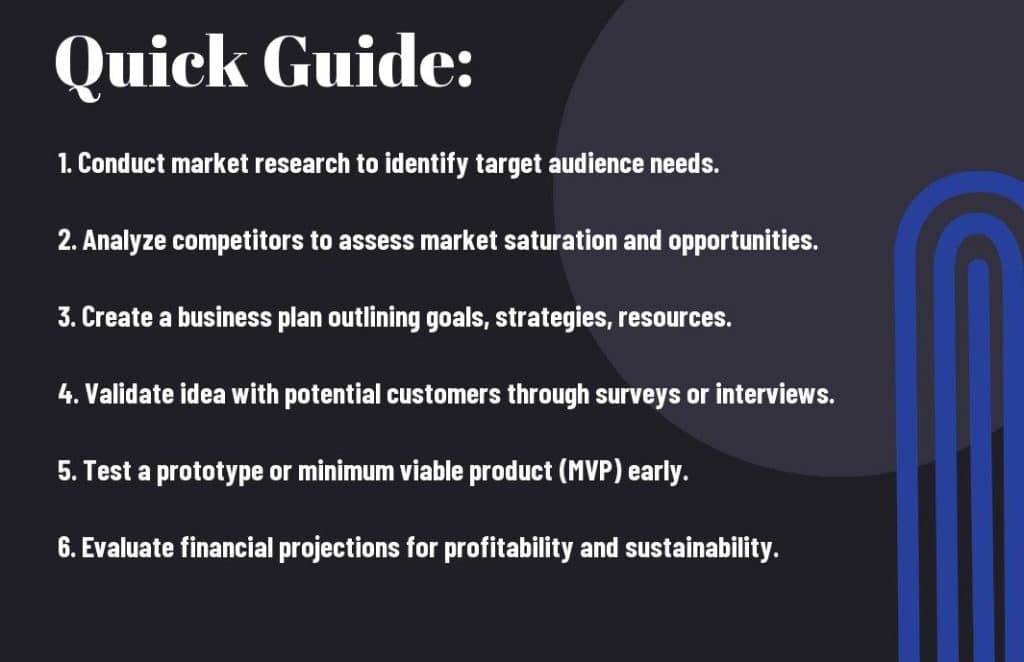How do I know if my business idea is viable?
Ideas can often seem brilliant in your mind, but determining their viability requires thorough evaluation. You must assess market demand, consider your competition, and identify your target audience to ensure you are on the right track. In this guide, you will learn important steps and practical tools to analyze your business idea, helping you make informed decisions that can lead to success. Let’s investigate the evaluation process, so you can confidently progress with your entrepreneurial journey.
Key Takeaways:
- Market Research: Conduct thorough research to assess demand, competition, and potential customer interest for your business idea.
- Financial Projections: Create detailed financial forecasts, including startup costs, revenue streams, and profitability, to evaluate the economic viability.
- Feedback Loop: Seek feedback from target customers and industry experts to refine your concept and address any potential weaknesses.

Understanding Business Idea Viability
For any aspiring entrepreneur, understanding business idea viability is imperative for moving forward. Viability encompasses the potential of your concept to be profitable and sustainable in the market. Evaluating its feasibility involves examining market demand, competition, your target audience, and any necessary resources to turn your idea into reality. By thoroughly analyzing these factors, you can gauge whether your idea is worthy of your time, effort, and investment.
Definition of Viability
Idea viability refers to the ability of a business concept to thrive in the marketplace. This includes its potential for profitability, scalability, and the capacity to meet customer needs. Evaluating viability helps you determine if your idea can lead to a successful and sustainable business venture.
Importance of Evaluating Your Idea
Business idea evaluation is imperative for minimizing risks and maximizing opportunities. Without a thorough evaluation, you may invest time and resources into an idea that isn’t viable. By assessing your concept, you can identify flaws, refine your approach, and be better prepared to enter the market.
Plus, understanding the importance of evaluating your idea helps you stay aligned with market trends and customer expectations. By doing this, you not only avoid costly missteps but also enhance your chances of developing a product or service that resonates with your audience. Taking the time to evaluate your idea enables you to create a solid foundation for your business and increases your confidence in making informed decisions.
Types of Business Ideas
Some business ideas fall into various categories that can help you assess their potential viability. Here’s a breakdown of different types:
| Type | Description |
|---|---|
| Innovative | Unique concepts or completely new approaches. |
| Replicative | Business models that adapt existing ideas successfully. |
| Service-based | Businesses focused on delivering services to customers. |
| Product-based | Companies that create and sell physical or digital products. |
| Hybrid | Combines elements of both services and products. |
This classification helps you analyze what type of business aligns best with your skills and market opportunities.
Innovative vs. Replicative Ideas
Now, differentiating between innovative and replicative ideas is necessary for assessing market needs. Innovative ideas introduce something entirely new, while replicative ideas adapt existing concepts for local markets. When choosing your path, consider what resonates more with your vision and the resources at your disposal.
Service-based vs. Product-based Ideas
Types of business ideas can also be categorized as service-based or product-based. Service-based ideas focus on providing intangible solutions, while product-based ideas revolve around tangible goods that customers purchase.
It’s important to recognize the dynamics of service-based versus product-based ideas to understand how each model operates. Service-based businesses may involve high personal interaction and customized solutions, while product-based companies often focus on inventory management and distribution. Your choice could significantly influence your marketing strategies, customer engagement, and overall business operations.
Factors to Consider
Now, to determine the viability of your business idea, you must examine various factors that influence success. Evaluate your concept comprehensively by considering:
- Market demand
- Competitive landscape
- Financial feasibility
- Your target audience
- Market trends
Any oversight in these areas may hinder your project’s potential for success.
Market Demand
If you want to succeed, understanding market demand is imperative. You need to assess whether there is a sufficient need for your product or service in the market. Conduct surveys, analyze industry reports, and gather feedback to gauge customer interest. This data will provide insights into whether your business idea meets a genuine demand.
Competitive Landscape
Consider how your business will fit within the existing competitive landscape. Identifying your competitors will help you understand what they offer and how you can differentiate your business. Investigating their strengths and weaknesses helps you pinpoint your own unique selling proposition.
With a clear picture of your competitors, you can craft strategies to position your offerings effectively. Analyzing competitors can also reveal gaps in the market that your business can exploit, contributing to a stronger foundation for your idea.
Financial Feasibility
Landscape your financial feasibility by estimating startup costs, operational expenses, and potential revenue. This step is critical to understand whether your business can sustain itself in both the short and long term. Make realistic projections based on market research and initial investment requirements.
It’s important to prepare a financial plan that considers different scenarios, including best-case and worst-case situations. This exercise not only helps you allocate resources wisely but also prepares you for challenges on your entrepreneurial journey, ensuring that you remain adaptable while navigating your business path.

Step-by-Step Evaluation Process
Many aspiring entrepreneurs wonder how to validate their business ideas effectively. To make this easier, you can follow a structured evaluation process that helps you gauge the potential of your concept. Below is a clear breakdown to guide your assessment:
Evaluation Process
| Step | Description |
| 1. Idea Validation | Identify the core value of your business idea. |
| 2. Market Research | Analyze the market demand and competition. |
| 3. Feedback | Seek input from potential customers and mentors. |
| 4. Business Model | Outline how your business will operate and generate revenue. |
| 5. Financial Planning | Prepare a budget and forecast expenses and profits. |
Conducting Market Research
While exploring into market research, you need to gather data on your target audience, competing businesses, and industry trends. This will help you understand customer needs and identify gaps in the market that your idea can fill. Utilize surveys, interviews, and online research to collect and analyze necessary information.
Crafting a Business Plan
Business planning involves outlining your goals, strategies, and operations for your venture. A comprehensive business plan serves as a roadmap to guide your efforts and secure funding if needed. It should include sections on market analysis, competitive advantage, financial projections, and marketing strategies.
Another important aspect of crafting a business plan is ensuring it is adaptable. As you gather more insights and feedback through your evaluation process, your plan should evolve. Be open to revising your strategies to align with market realities and internal capabilities, which will enhance your chances of success.
Tips for Assessing Viability
Not every idea will make it in the competitive market, so it’s imperative to conduct a thorough viability assessment. Here are some tips:
- Research your target audience and market demand.
- Analyze your competitors and identify your unique selling proposition.
- Evaluate your business model and potential revenue streams.
- Consider the resources and time required to launch your idea.
After gathering this information, you can draw informed conclusions about your business idea’s potential.
Seeking Feedback
The process of gathering feedback from potential customers is invaluable. Engage with your target audience to gauge their interest and willingness to pay for your product or service. Constructive criticism can highlight strengths and weaknesses you might not have considered. Utilize surveys, interviews, or focus groups to collect diverse perspectives.
Prototyping and Testing
If your idea is still promising after seeking feedback, the next step is to create a prototype or minimum viable product (MVP). This will allow you to test your idea in the real world.
With a prototype, you can observe how your target market interacts with your product or service, gathering insights that can be pivotal. This hands-on approach not only helps to refine your concept but also validates demand in a practical setting. Ensure you collect feedback through testing and make necessary adjustments based on user experiences to enhance your offering. Testing can save you time and resources while helping to build a solution that resonates with your audience.
Pros and Cons of Your Idea
To evaluate your business idea effectively, consider the pros and cons associated with it. This balanced perspective will help you make informed decisions moving forward.
Pros and Cons Breakdown
| Pros | Cons |
|---|---|
| High market demand | Intense competition |
| Unique value proposition | Limited initial funding |
| Potential for scalability | Regulatory challenges |
| Strong target audience | Market saturation risks |
| Passion for the industry | Time investment required |
Advantages of Pursuing the Idea
With a clear understanding of the pros, you can confidently pursue your business idea. Emphasizing unique strengths and market opportunities can position you for success while attracting potential investors and customers.
Potential Challenges and Risks
Cons weigh heavily on the sustainability of your business idea. You must navigate obstacles that could impede growth and profitability, affecting your overall vision.
Idea challenges may include financial constraints, unforeseen competition, and evolving market trends. Each risk could affect your ability to maintain a foothold in the industry. By addressing these factors upfront and developing contingency plans, you can mitigate risks and enhance the likelihood of success.
Conclusion
Hence, assessing the viability of your business idea involves a blend of market research, financial analysis, and feedback from potential customers. You should validate your concept through surveys or focus groups and analyze your competition and target audience. Additionally, creating a business plan can help outline your strategies and expected challenges. By systematically evaluating these aspects, you can make informed decisions and increase your chances of success in the competitive marketplace.
Q: What steps can I take to evaluate the viability of my business idea?
A: To evaluate your business idea, begin by conducting comprehensive market research. This involves identifying your target audience and analyzing competitors. Next, create a business model that outlines how you will generate revenue and sustain operations. Additionally, consider developing a prototype or a minimum viable product (MVP) to gather feedback from potential customers. Financial projections, including startup costs and break-even analysis, can also provide insights into the financial viability of your idea.
Q: How can I validate my business concept with potential customers?
A: Validation of your business concept can be achieved through direct engagement with your target market. Consider conducting surveys or interviews to gather feedback on your idea and its features. You could also host focus groups or run a pilot program to observe customer reactions. Online platforms such as social media can be effective for gauging interest and collecting opinions. Remember to analyze the feedback carefully to inform your decision-making process and enhance your offering.
Q: What financial factors should I assess to determine if my business idea can succeed?
A: Analyzing financial factors is imperative for assessing your business idea’s potential for success. You should estimate your startup costs, which include expenses such as equipment, marketing, and legal fees. Project your revenue streams and create a break-even analysis to determine when your business will begin to turn a profit. Additionally, consider your funding sources and evaluate whether you can sustain operations during the initial phase before generating substantial income.
Source article: https://smallbiztoolbox.com.au/how-do-i-know-if-my-business-idea-is-viable/









